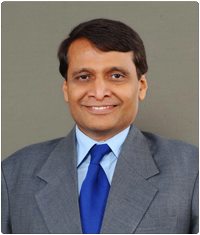Railway Minister Suresh Prabhu has indeed presented a good Budget. He has steered clear of the temptation of announcing new trains and populist measures. Despite the financial constraints, he is straining the exchequer; he is trying to generate alternate sources of funds instead. To that extent, the Railway Budget is also bold—but not bold enough. For, while it has discarded the paradigm of the yore, it has failed to provide the moral and intellectual justification for the new prototype that he intends to have in place. The Railway Minister has refused to point out that Indian Railways need to change tracks, as the policy framework shifts from statism to market economy. He has also shied away from emphasizing the importance of the private sector in reviving Railways.
It is not that Prabhu did not mention private players. In his speech, he said that “we will partner with the private sector to improve last mile connectivity, expand our fleet of rolling stock and modernize our station infrastructure.” But, fearful of attacks from the commies and other enemies of free economy, he hastened to add in the next sentences that Railways “will continue to be our precious national asset. It will continue to serve the common man. The people of India will always own Railways.” As if the private sector was a treacherous monster, eager to destroy national assets and fleece the common man!
The Railway Minister also talked about public-private partnerships and private freight terminals. But both in his speech and later comments, he tried to downplay private sector participation. Privatization, of course, was a forbidden word. In his first interview to a channel, Lok Sabha TV, he made it clear that privatization was not on the cards.
In general, Prabhu was unwilling to highlight the flaws of socialism, which has ruined Railways, and underline the virtuous nature of free economy. That is the crux of the problem: the reluctance to argue out the new policy framework, economic reforms, has been the bane of the nation since 1991 when liberalization began. This is the reason that the body economic of India has the likeness of an overgrown child: much of the growth is in the private sector and which has become increasingly capable, but economic policy remains restrained by the commanding height rhetoric. The body is getting stronger, but the mind is still clogged with Nehruvian shibboleths.
So, politicians and opinion makers still talk about ‘profiteering’; they incessantly complain about ‘crony capitalism.’ Businessmen are often presented as blood-sucking vampires; there are constant demands of tighter controls and regulations.
Finance Minister Arun Jaitley’s recent remarks should be seen in this context. Speaking in the Rajya Sabha on the amendments to the land acquisition law, he urged the Opposition to beware of anti-business phraseology. “Don’t create an environment where infrastructure and industry become bad words,” Jaitley said.
But the Congress is doing exactly that. Not a day passes when some or other leader of the party does not accuse the Bharatiya Janata Party of working for the rich and industry, and against the poor and farmers. The GOP, smarting under the series of ignominious electoral defeats, seems to be turning Leftward. Socialism is the last resort of the bunch of discredited politicians.
Against this backdrop, the BJP should argue, and argue forcefully, that there is no contradiction in being pro-rich and pro-poor, of being pro-industry and pro-agriculture at the same time. Development is not a zero-sum game, an either-or duality, in which only one section can benefit at the expense of the other; it is all-inclusive. When an industry thrives, it is not just a few fat-cat tycoons who prosper but also many more employees who benefit. Similarly, when the farm output is good, it is not only the tiller who gains but also such sectors as FMCG, cement, and automotive which get a leg up. Typically, their stocks soar in the Sensex.
Empirical evidence and common sense are against the Congress’ line of argument. But, unfortunately, the BJP is loath to counter the charges of its arch rival. So, the ruling party does not challenge the certitudes of socialist thinking. Hence Prabhu’s reluctance to openly promote privatization.
